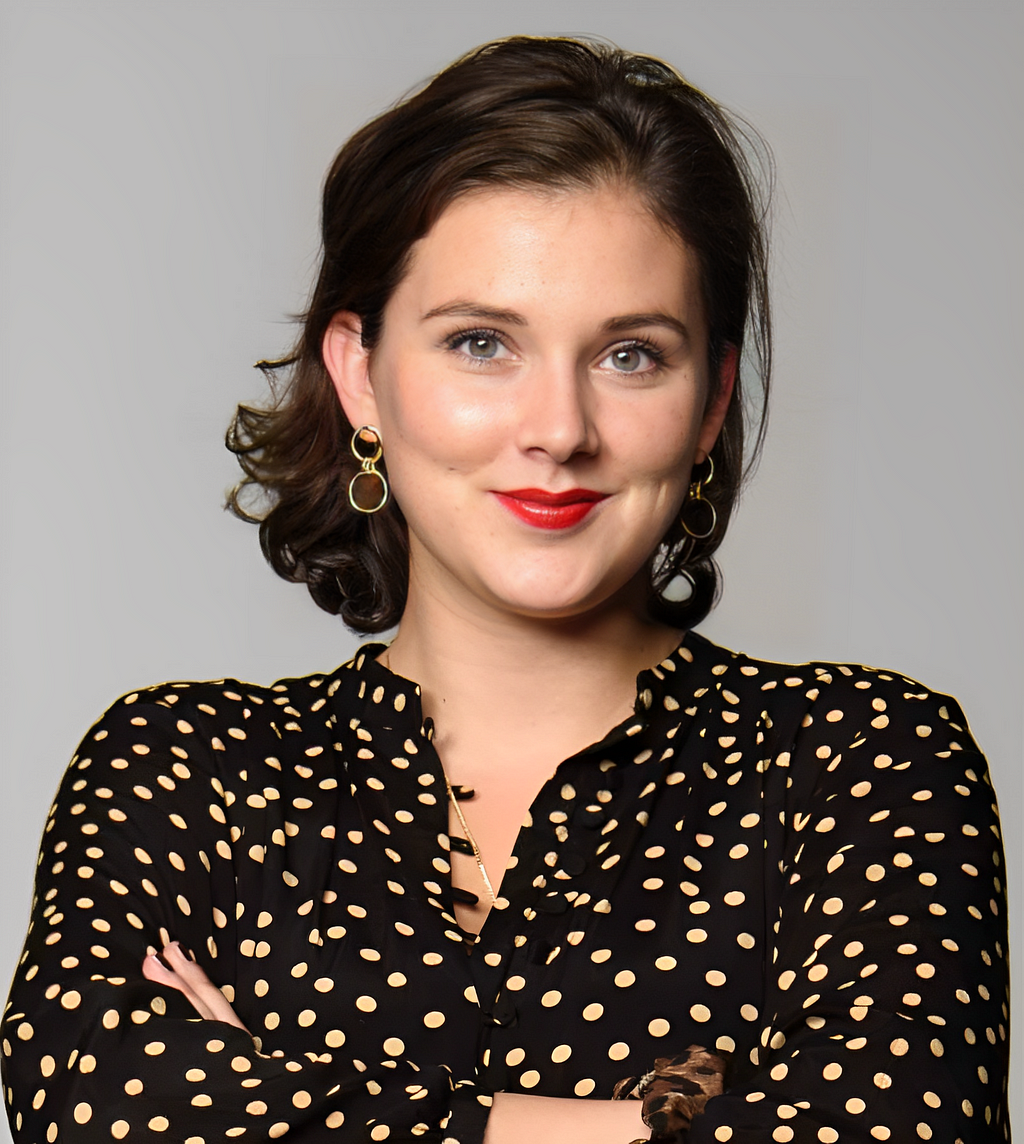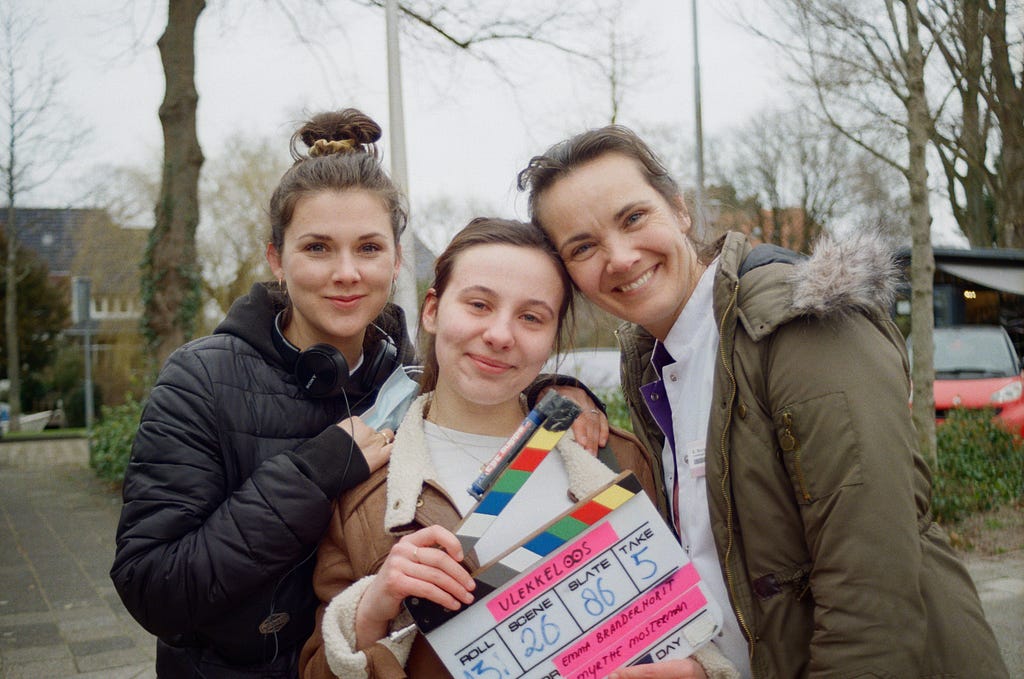Filmmakers Making A Social Impact: Why & How Filmmaker Emma Branderhorst Is Helping To Change Our World

… I think with our film we started to create awareness about period poverty. What I mostly hear from people who saw the film is that they had no clue this was such a big issue. After the premiere at the Berlinale (feb 2022) a woman came up to me. She told me she was a teacher at a high school and said to me, ’Your film really showed me that this subject is very hard to see, and that they’re more girls than you think experience period poverty. From now on I will put sanitary napkins on every toilet, and I will tell other people to do it as well’. For me this moment was a breakthrough. The film inspires people to take action themselves, and I think that’s the biggest compliment.
As a part of our series about “Filmmakers Making A Social Impact” I had the pleasure of interviewing Emma Branderhorst.
Emma Branderhorst is a 26-year-old director from Amsterdam. In her work She mainly deals with major social themes, which she makes into a personal and intimate story. Her stories are mostly from the female perspective. In her previous work Branderhorst has dealt with themes such as period poverty, children of war and bullying. Although these themes sound heavy, she always tries to apply a light tone. The ‘slice of life’ effect is very important in her work which is how she is able to make the characters feel ‘alive’ and that the story doesn’t only focus on the problem. In 2019 she graduated from the Hogeschool voor de Kunsten in Utrecht with the short film Onderhuids (Under the Skin). This film is about the struggle and urge to belong to a group, at the expense of others which often happens in a very subtle devious way amongst girls. She based this film on my own experiences during her high school days.
This film premiered at the Berlinale in 2020 and they won many prizes, including at the Cinekid festival (best short film) in Amsterdam and Branderhorst won the Wildcard worth 50,000 euros at the Netherlands Film Festival. She could never have dreamed of this kickstart. Then she started working on her new film Spotless (Vlekkeloos), a film about period poverty. This film premiered at the Netherlands Film Festival and will play in October at the HER festival in collaboration with Cinetree and at the Cinekid festival. Branderhorst is currently working on her new film Ma Mere, et Moi: A short road movie about a mother and daughter.
In addition to her fiction projects, she is affiliated with PINK RABBIT for her commercial work. In Branderhorst’s commercial work she tries to create subtle, sensitive and realistic campaigns. She sees it as her duty to paint a realistic picture of reality in commercial work as well.
Thank you so much for doing this interview with us! Before we dive in, our readers would love to get to know you a bit. Can you share your “backstory” that brought you to this career?
It’s a funny story. First of all, I wanted to be an actress. I loved playing, but I also taught children theatre when I was young. From my 16th till 19th, I did auditions at the theatre schools. The last time I came all the way till the last round. I had this feeling that I was my year! I already rented a room in Amsterdam, close to the theatre school. But then I got the phone call, they didn’t let me in. Still too young, ‘explore yourself’ was their answer. I was so disappointed, and I had a big problem: I had this incredible high rent in Amsterdam and no friends in this city. I worked in several cafes in Amsterdam, to pay my rent and keep myself occupied, while figuring out what was my next step. Through some people I’ve met at the cafe’s I heard about the Academy of Arts in Utrecht, focused on storytelling and making films. I came through the big auditions at the school, and I thought ‘this is probably it’. The school was absolutely amazing. In the second year I made my first short film and from that moment I knew I didn’t want to do anything else anymore. I fell in love with directing.
It has been said that our mistakes can be our greatest teachers. Can you share a story about the funniest mistake you made when you were first starting? Can you tell us what lesson you learned from that?
Good question. I think this is something that happened at my graduation film. I was very focused on the result and the scenes I had in my head. But, as you know, filmmaking is also about adjusting. But for the opening scene of my film, the film is about girl venom in a synchronized swimming group, I had the image of a top shot where you saw all the girls. After the top shot the crane had to move down, so we created this close up of our main character, pushed in the air by the other girls. It sounds lovely right? But of course, way too difficult for us students. When we tried to set up the top shot with the crane, we came across some very interesting challenges… First of all, the crane couldn’t turn the way we wanted, the crane wasn’t able to come close to the water and I think the first thing was… There was like a suction system in the water, so the girls couldn’t stay in position, so they drove out of shot all the time. It was a total nightmare.
So what this scene teacher me is; keep it small. And if you want to make It big, work with professionals 🙂
Who are some of the most interesting people you have interacted with? What was that like? Do you have any stories?
The most interesting people for me are the people I work with on my films. You build a trust together and creating this world around a story and a character. That’s magic for me.
Which people in history inspire you the most? Why?
When I talk about directors it’s definitely Ken Loach and Andrea Arnold. Maybe it’s not really in the history, because they’re still alive now. But for me they are a big inspiration, their work is so pure and taken from real stories. Also the way they cast their main characters and how they approach stories and character development is really something that inspires me, also to apply on my own work.
Let’s now shift to the main focus of our interview, how are you using your success to bring goodness to the world? Can you share with us the meaningful or exciting social impact causes you are working on right now?
Last year I made the film Spotless, a film about period poverty. In the film we follow the 15-year-old Ruby who doesn’t dare to ask her mother for sanitary napkins because she knows there’s not enough money for it. With this film we wanted to create awareness about period poverty. And I’m in the postproduction of my new short film, ‘Ma Mere et Moi (My mother, and I), about a symbiotic mother daughter relationship. And how important it is, at a certain point, to let each other go, to grow both. Also working on my first feature, about a young girl who experience the alcoholism from her mother. And of course, many other plans, but those are the most important for now.
Many of us have ideas, dreams, and passions, but never manifest it. But you did. Was there an “Aha Moment” that made you decide that you were actually going to step up and take action for this cause? What was that final trigger?
You mean for the film about period poverty? In my work it’s very important to tell stories from the female perspective, but also to tell stories about subject in our society need more attention. For me the ‘Aha moment’ was when I read an article about period poverty, during my research to make a film about the taboo on period. But when I read the article, I couldn’t really imagine period poverty… I have never heard of it either. So, we changed our research path and dived into period poverty.
Can you tell us a story about a particular individual who was impacted or helped by your cause?
I think with our film we started to create awareness about period poverty. What I mostly hear from people who saw the film is that they had no clue this was such a big issue. After the premiere at the Berlinale (feb 2022) a woman came up to me. She told me she was a teacher at a high school and said to me, ’Your film really showed me that this subject is very hard to see, and that they’re more girls than you think experience period poverty. From now on I will put sanitary napkins on every toilet, and I will tell other people to do it as well’. For me this moment was a breakthrough. The film inspires people to take action themselves, and I think that’s the biggest compliment.
Are there three things that individuals, society or the government can do to support you in this effort?
Of course what I said in this question before. You can start yourself and start small. Just put the products on the toilet, wherever you work, even if it’s at home. On the other side I think the government in every country can change the tax on the products. Now (here in Holland) there’s still a 21% tax on it, it’s still seen at luxury product. The big companies like OB and Always are still making a lot of money on it. It should be part of the health insurance; for instance look at Scotland. It is possible to make a change!

What are your “5 things I wish someone told me when I first started” and why. Please share a story or example for each.
- You don’t have to tell very big stories, just stay close to yourself
- Invest a lot of time in casting, never settle for less
- Around yourself with people with more experience, they can lift you up
- Look for people around to work with that you feel comfortable, when you feel comfortable you are on your best!
- Just do it, never hesitate!
We are very blessed that many other Social Impact Heroes read this column. Is there a person in the world, or in the US, whom you would like to collaborate with, and why? He or she might see this. 🙂
Ooh, good question. I would really have a cup of coffee with Ken Loach. I like the way he works and find his social themes for his films. I could learn a lot from him, I think.
Can you please give us your favourite “Life Lesson Quote”? Can you share how that was relevant to you in your life?
Surround yourself with people who have more experience than you. This is so important because you learn so much more from the people around you.
How can our readers follow you online?
Follow me on @emmabranderhorst and follow the film on @spotlessthefilm
This was great, thank you so much for sharing your story and doing this with us. We wish you continued success!
Filmmakers Making A Social Impact: Why & How Filmmaker Emma Branderhorst Is Helping To Change Our… was originally published in Authority Magazine on Medium, where people are continuing the conversation by highlighting and responding to this story.
